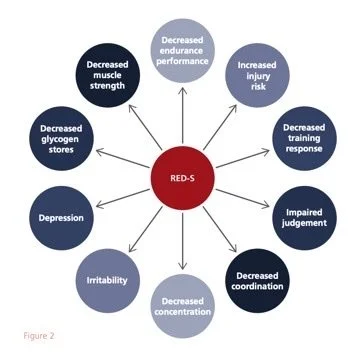Why Under-Fuelling Will Break You
What Is RED-S?
Relative Energy Deficiency in Sport (RED-S) happens when you’re not eating enough to match your training load. It’s not just about calories — it’s about energy availability; if your body doesn’t have enough fuel, it will start shutting down your systems to enable you to be kept alive.
That means:
Hormones go out of balance.
Bone health suffers (stress fractures, brittle bones).
Immune system weakens (you catch every cold going).
Performance drops.
And here’s the kicker: sometimes weight loss and faster times appear first. Which is why RED-S is so sneaky, it can look like you’re thriving, when really you’re breaking down.
What Are The Red Flags
Signs that you might not be fuelling enough:
Constant fatigue, even after resting
Frequent injuries or niggles that won’t heal or go away.
Loss of periods (for women) or reduced testosterone (for men).
Always getting ill - catching every cold going.
Feeling “flat” with no motivation, brain fog and mood swings.
If any of this sounds familiar, it’s worth stopping to check in with yourself.
Why It Happens
Runners often slip into RED-S for understandable reasons:
Thinking lighter = faster.
Skipping meals to “burn more fat.”
Not feeling hungry after long runs.
Busy lives, grabbing food on the go.
Social media messages about “eating clean” or “less is more.”
It doesn’t help that marathon training already makes you tired and hungry, so it’s easy to miss the difference between normal training fatigue and something more serious.
How to Protect Yourself
Think of fuelling as part of your training, not an optional extra.
Before a run: eat something — even half a bagel, a banana or toast (who doesn’t like toast?)
During long runs: 30–60g carbs per hour (yes, that’s gels, drinks, or real food).
After a run: carbs + protein within 60 minutes.
Daily: 5–10 g carbs per kg of body weight (depending on training load), and 1.2–2 g protein per kg.
Food isn’t just fuel for running, it’s fuel for your bones, hormones, brain, and recovery.
Read more about RED-S here
My Message to You
I’ve seen too many runners chase thinness and pay the price with injury, fatigue, and disappointment. I’ve also seen runners fuel properly, embrace strength, and not only perform better on the day but enjoy the whole process more.
So please, please, don’t under-fuel and never apologise for eating, calories are the enemy. If you want to run long, stay strong, and keep enjoying running for years to come, then fuel right to run strong.

